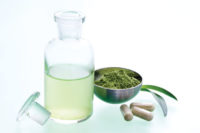News: Soy Protein May Reduce Risk of Prostate Cancer
The study, "Soy protein isolate increases urinary estrogens and the ratio of 2:16 alpha-hydroxyestrone in men at high risk of prostate cancer," is believed to be the first study investigating the effects of soy protein consumption on estrogen metabolism and prostate cancer in men.
"The intent of the study was to evaluate the effects of consuming soy protein on elimination of estrogen metabolites in the urine of men at a high risk for prostate cancer," said Dr. Mindy Kurzer, lead author of the study and a professor in the Department of Food Science and Nutrition at the University of Minnesota. "After taking biopsies of prostate tissue, androgen receptors were reduced in the prostate, which is consistent with a reduced risk of prostate cancer. In addition, significantly fewer of the men who consumed soy protein progressed to cancer by the end of the six-month study. We are encouraged by the results, but more studies must be performed."
"The results of this study could be beneficial for men who are at risk of prostate cancer," said Dr. Kathryn Greaves, group lead, Clinical Nutrition at Solae. "If the results of this study are replicated in future studies, reducing the risk of prostate cancer may be another reason to include soy in your daily diet."
Soy has been documented to potentially improve heart health and aid in sports performance and weight management.
From the October 8, 2007, Prepared Foods e-Flash
Looking for a reprint of this article?
From high-res PDFs to custom plaques, order your copy today!




